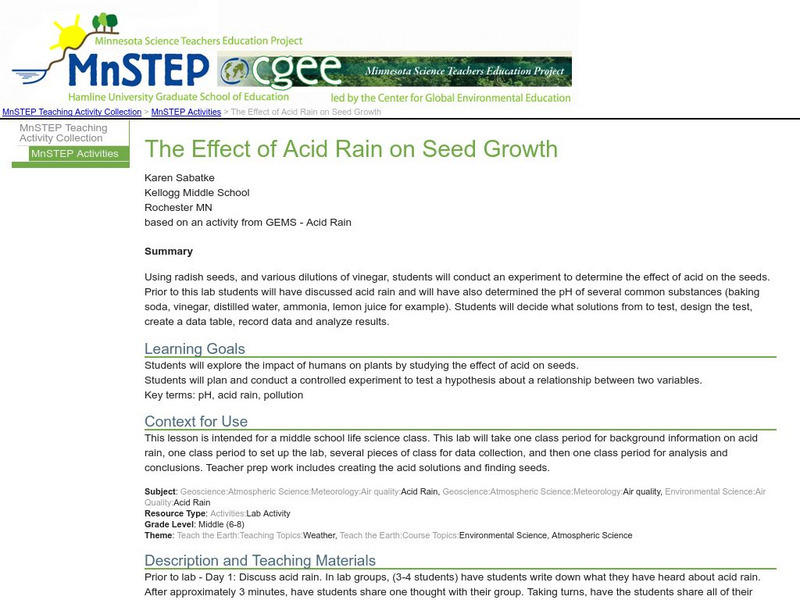American College of Sports Medicine
Selecting and Effectively Using Hydration for Fitness
How much water does your body lose during exercise? How much should you hydrate during and after exercise? Address the importance of hydration with your young athletes using this informative handout.
NOAA
Methane Hydrates – What's the Big Deal?
Have you ever tried to light ice on fire? With methane hydrate, you can do exactly that. The ice forms with methane inside so it looks like ice, but is able to burn. The lesson plan uses group research and a hands-on activity to help...
NOAA
Exploring Potential Human Impacts
Arctic sea ice reflects 80 percent of sunlight, striking it back into space; with sea ice melting, the world's oceans become warmer, which furthers global warming. These activities explore how humans are impacting ecosystems around the...
Baylor College
Water in Your Body
Do you know how much water you have had in the last 24 hours? Do you know how much your body needs? In this hands-on activity, your class members will estimate how much water our bodies lose each day by filling and emptying one-liter...
NOAA
What's the Big Deal?
Who knew that a possible answer to Earth's energy resource problems was lurking deep beneath the ocean's surface? Part four of a six-part series introduces Earth Science pupils to methane hydrate, a waste product of methanogens. After...
Stanislaus State University of California
Survival Skills 101
Prepare individuals for any type of survival situation with a presentation that focuses on basic survival skills. With a variety of how-to's, including the best ways to treat injuries, the importance of staying...
NOAA
Energy from the Oceans
Can Earth's oceans produce a steady supply of clean energy? Scholars explore the uses of tidal and thermal energy in the 11th installment of a 13-part series about ocean-based alternative energy sources. Learners examine the...
Curated OER
What's the Big Deal?
Students explore and define methane hydrates and describe ways that it can impact their own lives. In this methane hydrate lesson students create a molecular model and research methane hydrate.
Curated OER
Harvesting Hope: The Story of Cesar Chavez
Students identify productive resources that are important to migrant workers. In this lesson plan on resources, students give examples of natural resources, human resources and capital resources that apply to migrant workers. This lesson...
Outdoor Learning Center
Outdoor Survival
Which of the following can you survive without for the longest time: water, food, or a positive mental attitude? The answer may surprise you. Guide learners of all ages through games, activities, and discussions about surviving in the...
Curated OER
Entering the Twilight Zone
Students describe major features of cold-seep communities and the process of chemosynthesis as it relates to organisms in each habitat. In this deep-sea habitats lesson, students study the categorization of ocean habitats...
Curated OER
What's the Big Deal?
Learners define terms and describe where they are found and formed. In this methane lesson students complete an activity and describe ways in which methane hydrates impact our lives.
Curated OER
Visualizing the Greenhouse Effect and Global Warming
Students discover the differences between global warming and the greenhouse effect through hands-on classroom experiences. They use a 2-D globe and picture cards to identify the causes of both. Students visualize the human influence on...
Smithsonian Institution
Watching Crystals Grow
Amazing science can sometimes happen right before your eyes! The class gets cozy as they watch crystals grow. They use Epsom salts, rocks, and food coloring to create crystals. They'll observe the entire process, documenting every step...
Curated OER
Exploring Explorations-Ocean Exploration
Students learn about Earth's deep ocean discoveries and their benefits. In this ocean exploration lesson, students review previous explorations of the Earth's deep oceans and learn about the discoveries of the past.
Science Education Resource Center at Carleton College
Serc: Mn Step: The Effect of Acid Rain on Seed Growth
A lab activity that takes place over a few weeks, where students first determine the pH of different solutions, then choose three that are acidic. They set up petri dishes with radish seeds and hydrate them with the different solutions...















